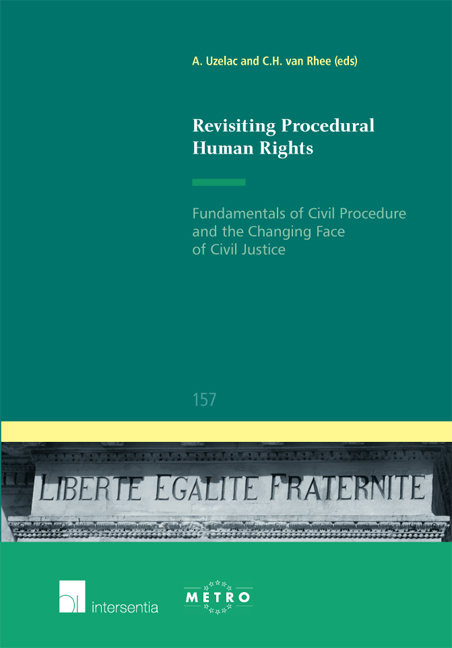 Revisiting Procedural Human Rights
Revisiting Procedural Human Rights from Introduction
Published online by Cambridge University Press: 13 October 2018
Introduction
The idea of human rights as fundamental rights of every individual is certainly one of the most powerful ideas of our modern age. Since the American and French revolutions, human rights have been the strongest link between law and democracy. They played a crucial role when defining notions of constitutionalism and the rule of law.
While some human rights were made famous by national mottos like the French liberté, égalité et fraternité, the other human rights have not attracted such attention. Generally, substantive human rights were discussed and appreciated more than procedural human rights. Some attention of the public, media, art and literature was given to the rights of the accused in criminal proceedings, such as the right to professional legal defense and the privilege against self-incrimination. These rights attracted considerable attention among scholars of comparative procedural law. Civil justice, on the contrary, was never considered so exciting - yet, without an effective and well-balanced set of procedural rights, the substantive rights and freedoms of almost any business and individual would not enjoy effective protection before the civil courts of law.
Based on the wish to reopen an international comparative discussion on fundamental notions of civil procedure, this book offers a number of insights in procedural human rights from different jurisdictions and different angles of view. While some previous studies focused on Northern Europe, many of the authors in this book come from Southern and Eastern Europe (e.g. Romania, Russia, Slovenia, Croatia, but also from outside Europe, e.g. South Africa), areas where a common understanding of procedural human rights may be an even more pressing necessity. Some initial premises are however shared by all contributors to this book.
First, the general background of the contributions collected in this book is the finding that various developments in the contemporary world do not favour procedural human rights. Two major challenges to both global and European justice systems have been particularly significant in the past decade: the economic crisis and the ever-increasing frequency of emergency situations. The economic crisis brought policies of austerity, which limited the available judicial resources and made recourse to judicial proceedings more difficult and expensive.
To save this book to your Kindle, first ensure no-reply@cambridge.org is added to your Approved Personal Document E-mail List under your Personal Document Settings on the Manage Your Content and Devices page of your Amazon account. Then enter the ‘name’ part of your Kindle email address below. Find out more about saving to your Kindle.
Note you can select to save to either the @free.kindle.com or @kindle.com variations. ‘@free.kindle.com’ emails are free but can only be saved to your device when it is connected to wi-fi. ‘@kindle.com’ emails can be delivered even when you are not connected to wi-fi, but note that service fees apply.
Find out more about the Kindle Personal Document Service.
To save content items to your account, please confirm that you agree to abide by our usage policies. If this is the first time you use this feature, you will be asked to authorise Cambridge Core to connect with your account. Find out more about saving content to Dropbox.
To save content items to your account, please confirm that you agree to abide by our usage policies. If this is the first time you use this feature, you will be asked to authorise Cambridge Core to connect with your account. Find out more about saving content to Google Drive.